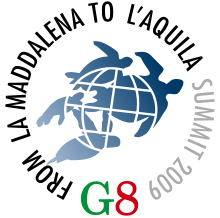G8 summit in L'Aquila 2009
The G8 summit in L'Aquila in 2009 was a meeting of the Group of Eight in the Italian L'Aquila . The 35th G8 summit took place from July 8-10, 2009. The newly elected US President Barack Obama took part in this summit for the first time . The meeting was chaired by the Italian Prime Minister Silvio Berlusconi . On July 9th, as part of the dialogue process agreed at the G8 summit in Heiligendamm, the members of the so-called G5 (emerging countries) also took part in the deliberations.
The G8 summit in 2009 was originally planned to take place on the island of La Maddalena off Sardinia , but on April 23, 2009 Silvio Berlusconi announced that the meeting would be moved to L'Aquila. Berlusconi wanted to draw the world's attention to the region destroyed by the earthquake on April 6, 2009 and give the residents a sign of hope.
The venue was the Guardia di Finanza barracks in the Coppito district, which remained undamaged by the earthquake.
To protect the summit, the Italian Ministry of Defense coordinated the joint security operation of the armed forces and civil defense Giotto 2009 .
Attendees
|
|
The European Union was represented by the Council President, Swedish Prime Minister Fredrik Reinfeldt and Commission President José Manuel Barroso . The heads of government of the Netherlands, Spain, Turkey and Egypt as well as the Libyan "revolutionary leader" Gaddafi were invited as special guests.
International organizations and communities of states : United Nations , World Trade Organization , World Bank , African Union , African reformist community NEPAD , European Commission , International Monetary Fund , OECD , International Energy Agency , International Labor Organization , World Food Organization , International Fund for Agricultural Development and the World Food Program of the United Nations .
Topics and results
Climate change , energy, development cooperation , intellectual property and the Heiligendamm process were on the agenda of the G8 . The decision to reduce CO₂ provides for global emissions to be halved by 2050 compared to 1990 levels.
Climate change
In L'Aquila, the upcoming negotiations for a Kyoto follow-up protocol were discussed in Copenhagen . The G8 heads of state and government declared that they want to stick to the goal of halving greenhouse gas emissions . However, the question of funding remained open. The G8 states, together with other industrial nations, agreed to limit the global temperature increase to two degrees Celsius by 2050 compared to the beginning of the industrial age .
Financial policy
Another topic was the global financial crisis . In L'Aquila, Chancellor Merkel spoke out in favor of adhering to the goal of a new constitution with rules and controls for the international financial markets. Only through these measures can future crises be avoided, Merkel had already declared before the summit.
Development policy
The G8 renewed their commitment at the G8 Summit in Gleneagles in 2005 to double development aid for Africa by 2010 and to provide full debt relief for heavily indebted countries. On the last day of the summit, 39 representatives from these countries were invited to discuss the consequences of the global financial crisis for developing countries. Even before the beginning of the summit, the Financial Times reported that the G8 states had agreed to aid for agricultural development in the amount of twelve billion dollars, which the Italian Prime Minister Berlusconi confirmed. The aid program was presented by US President Obama at the end of the summit and provided for payments of $ 20 billion over a period of three years. Some observers interpreted this at the summit as a turning point in American foreign policy.
Economic policy
The G8 heads of state and government agreed new talks for the deadlocked Doha Round of the World Trade Organization . The G8 countries as well as the Group of 5 (China, India, Brazil, Mexico and South Africa) confirmed their will to reach an agreement by 2010.
Individual evidence
- ^ Il governo sposta il G8 all'Aquila. La Repubblica, April 23, 2009, accessed July 4, 2009 (Italian).
- ↑ L'Aquila levels a basketball court for Obama. Tagesanzeiger, July 3, 2009, accessed July 4, 2009 .
- ^ Italy, L'Aquila: the security measures for the G8 . Avionews. July 8, 2009.
- ↑ Fritz Vorholz : " The industrialized countries cemented inequality in CO2 emissions at the G8 summit ". DIE ZEIT No. 30, July 16, 2009
- ↑ a b c Crisis management in the disaster area. G-8 summit in L'Aquila. spiegel.de, July 8, 2009, accessed September 9, 2015 .
- ↑ a b c Much decided, little happened? Results of the G-8 summit. faz.net, June 3, 2015, accessed September 9, 2015 .
- ↑ a b G8 celebrates the summit of unity. Résumé in L'Aquila. spiegel.de, July 10, 2009, accessed on September 9, 2015 .
- ↑ Obama presents billions against hunger. spiegel.de, July 10, 2009, accessed on September 9, 2015 .
- ^ Pseudo-Poker for Globalization. G8 and the WTO. spiegel.de, July 9, 2009, accessed September 9, 2015 .
Web links
- Official website of the G8 summit in L'Aquila 2009 (Italian, English)
- G8, G5, Gaddafi - who comes to the summit? ( Memento from July 11, 2009 in the Internet Archive ), tagesschau.de , July 8, 2009.


